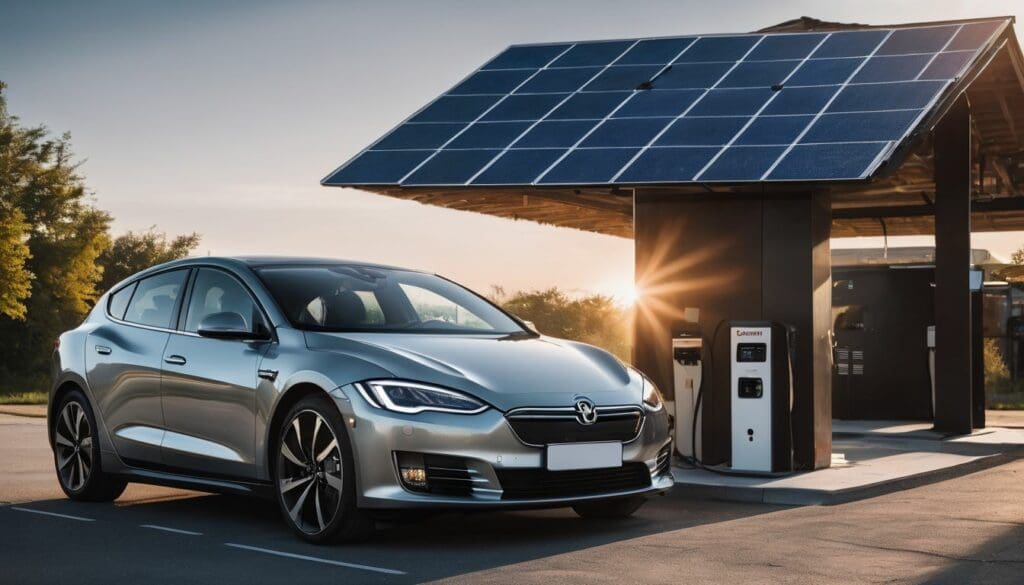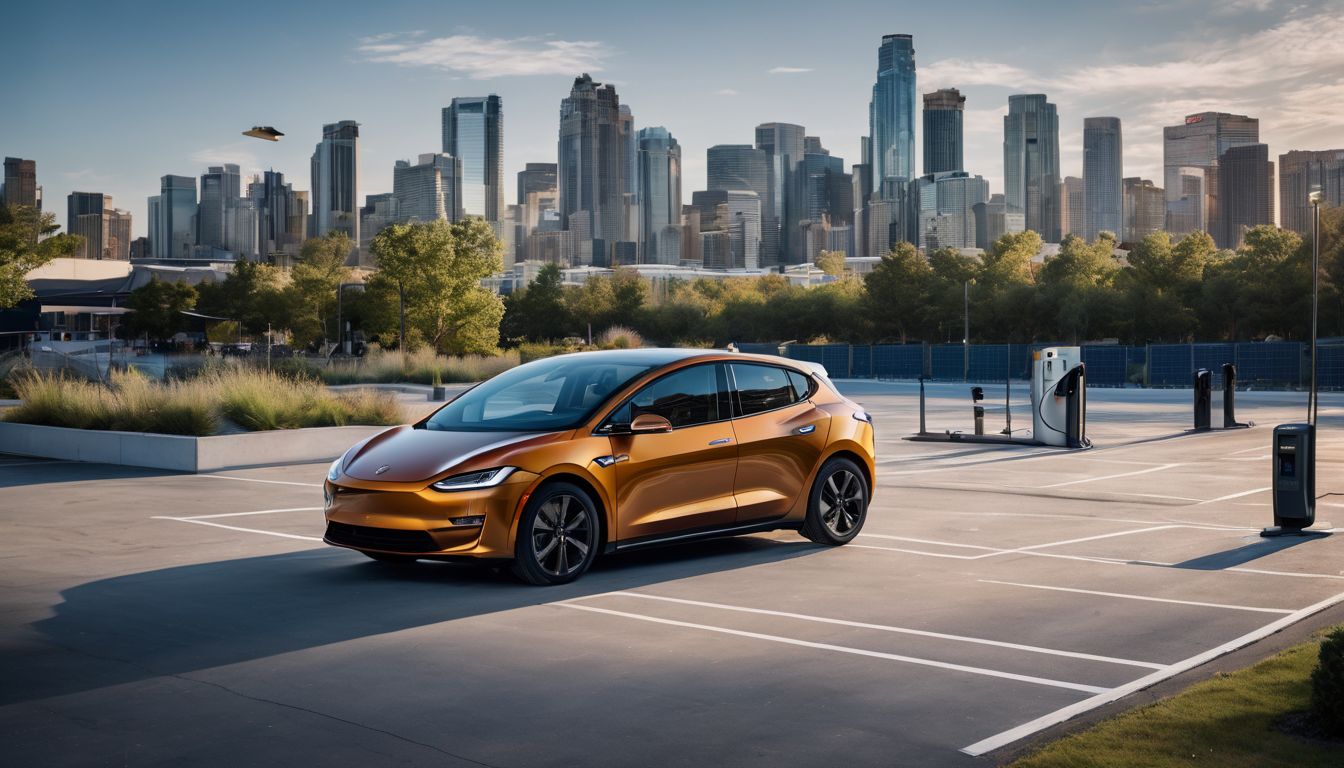Are you curious about the financial implications of owning an electric vehicle? Concerned about the costs and benefits of making the switch from a traditional gas-powered car? Well, we’ve been there too! Did you know that over 1.5 million electric cars were sold globally in 2020? In this blog, we’ll break down the economics of electric vehicle ownership and help you understand if it’s the right choice for you. Ready to dive into the world of electric cars?
Key Takeaways
- Electric vehicles (EVs) often have a higher initial purchase price compared to traditional cars, but owners can save money in the long term on fuel and maintenance costs.
- EV owners may benefit from tax incentives and rebates which help reduce the overall cost of owning an electric car.
- While EV batteries might need replacement after several years, technology improvements are making them more affordable and longer-lasting.
- Electric vehicles depreciate at a slower rate than gas – powered cars, helping to preserve their value over time.
- Choosing an electric vehicle not only provides financial benefits but also helps reduce harmful emissions, contributing positively to the environment.
Overview of the topic
We delve into the economics of electric vehicle ownership to understand what it really costs to own an EV. Factors like initial purchase price, battery replacement and depreciation are essential elements that affect your wallet.
But let’s not forget the potential savings on fuel and maintenance when shifting from traditional gas-powered vehicles.
Exploring this subject helps us make informed decisions about sustainable transportation. We weigh up long-term financial benefits against upfront costs, considering government incentives, energy efficiency and the increasing convenience of electric vehicle charging stations.
Our aim is to uncover if going green with our transport can also save some green in our pockets.
Importance of understanding the financial implications of electric cars
Understanding the financial implications of electric cars is crucial for us to make informed decisions. Owning an electric vehicle isn’t just about paying the purchase price; it involves considering the total cost of ownership, which includes ongoing expenses like fueling, maintenance, and potential tax benefits.
We must weigh these costs against traditional gas-powered vehicles to see where we can save money in the long run.
Navigating through electric car markets requires us to understand terms like residual value and battery replacement costs. It’s not enough to be drawn in by lower fuel and maintenance savings; we also need to take into account how quickly EVs depreciate compared to their petrol counterparts.
By getting a clear picture of these economic factors, we ensure our move towards green transportation aligns with our budget and helps in conservation efforts without any surprises down the road.
The Cost of Electric Vehicle Ownership
Electric vehicles have a lower initial purchase cost, but factors like depreciation and potential battery replacement should be considered. To learn more about the financial implications of owning an electric car, keep reading.
Initial purchase cost
The initial purchase cost of an electric vehicle is typically higher than that of a traditional gas-powered car. However, with the government incentives and lower running costs, the total ownership expenses tend to balance out over time.
When comparing the total cost of ownership for an EV versus a conventional vehicle, factors like fuel and maintenance savings need to be considered. Additionally, battery replacement should be taken into account when assessing long-term costs.
In many cases, electric vehicles can provide significant savings on fuel and maintenance in the long run compared to traditional cars. It’s essential to weigh these benefits against the upfront investment required for purchasing an electric car.
Depreciation
Electric cars depreciate more slowly than traditional vehicles, making them a wise investment for the long term. The slower depreciation rate also helps to minimise the total cost of ownership for electric vehicles over time.
Factors such as battery lifespan and technological advancements in electric vehicle manufacturing contribute to this advantage, ensuring that environmentally conscious individuals can benefit financially from owning an electric car.
Battery replacement
As we consider the cost of owning an electric vehicle, it’s important to factor in potential battery replacement expenses. Electric car batteries have a limited lifespan and may need to be replaced after several years of use.
However, advancements in technology are continuously improving the longevity and affordability of EV batteries, which helps reduce the overall cost of ownership.
When evaluating electric vehicles for purchase, it’s essential to inquire about the warranty coverage and estimated battery lifespan. Additionally, staying informed about developments in battery technology can provide insight into future replacement costs and potential savings as the market evolves.
Savings and Benefits of Electric Vehicles
Electric vehicles offer significant savings in fuel and maintenance costs, providing a more cost-effective option for environmentally conscious individuals. The convenience of recharging at home or at charging stations also adds to the overall benefits of electric vehicle ownership.
Fuel and maintenance savings
Electric vehicles offer significant fuel and maintenance savings compared to traditional gas-powered cars. With an electric car, the cost of charging is notably lower than filling up a petrol tank.
Additionally, EVs have fewer moving parts than internal combustion engine vehicles, resulting in reduced maintenance needs and costs over time.
EV owners benefit from reduced expenditure on oil changes, transmission repairs, and other regular upkeep associated with traditional cars. This not only saves money but also reduces overall vehicle downtime for servicing.
Convenience of recharging
Transitioning from the savings on fuel and maintenance, another noteworthy aspect of electric vehicle ownership is the convenience of recharging. Access to charging stations continues to improve with more public locations installing EV chargers, making it increasingly convenient for drivers to top up their batteries while out and about.
Furthermore, technological advancements in fast-charging capabilities mean that recharging an electric car can be as quick as refuelling a traditional vehicle with petrol or diesel.
In addition to public infrastructure developments, many EV owners choose to install home charging stations. This option provides the ultimate convenience, allowing them to recharge their vehicles overnight without having to make time-consuming stops at gas stations during busy daily schedules.
Environmental benefits
Electric vehicles offer significant environmental benefits, reducing harmful emissions that contribute to air pollution and climate change. By choosing an electric car, we can play a vital role in lowering our carbon footprint and protecting the environment for future generations.
Additionally, electric cars help decrease our reliance on finite fossil fuels which in turn contributes to the conservation of natural resources.
As we consider the impact of transportation on the environment, it’s clear that electric vehicles are a crucial part of transitioning towards sustainable and eco-friendly mobility solutions.
Impact on the Automotive Industry and Economy
Electric cars are revolutionising the automotive industry, driving innovation and investment in sustainability. Tax incentives and rebates are also supporting the growth of the electric vehicle market, with positive implications for the economy and environment.
Revolutionizing the industry
Revolutionising the industry, electric vehicles are spurring innovation and competition among automakers. This shift towards clean transportation is reshaping the automotive landscape and motivating traditional manufacturers to invest in electric vehicle technologies.
Subsequently, this has led to an increase in charging infrastructure development, creating a more convenient environment for electric car owners.
Tax incentives and government support have accelerated the adoption of electric vehicles, contributing to a surge in market growth. Furthermore, environmental consciousness is driving consumer demand for sustainable mobility solutions; as a result, companies are prioritising eco-friendly practices across their operations.
Tax incentives and rebates
When purchasing an electric vehicle, it’s important to consider the various tax incentives and rebates available. These financial incentives can significantly offset the initial purchase cost, making electric cars more affordable and enticing for environmentally conscious individuals.
Additionally, these incentives lessen the economic burden of transitioning to electric vehicles and contribute to the overall growth of the electric vehicle market.
It’s worth noting that tax incentives and rebates vary by location; therefore, it’s crucial to research and understand what is available in your area. By taking advantage of these benefits, you not only contribute to a sustainable future but also enjoy immediate financial advantages.
Environmental impact
Transitioning from the topic of tax incentives and rebates to the environmental impact, it’s important to note that electric vehicles (EVs) have a significantly lower environmental impact compared to traditional petrol-powered cars.
By eliminating tailpipe emissions, EVs help reduce air pollution, resulting in cleaner and healthier communities. Additionally, the reduced reliance on fossil fuels for transportation also contributes to lowering greenhouse gas emissions, thereby combating climate change.
Embracing electric vehicle technology is a substantial step towards preserving our environment for future generations.
Moreover, with advancements in renewable energy sources such as solar and wind power, the charging of EVs can be done using clean energy. This further minimises their carbon footprint and supports sustainable practices that align with conservation efforts.
Total Cost of Ownership Comparison
We will compare the total cost of owning an electric vehicle versus a traditional gas-powered vehicle, taking into account factors like fuel costs, maintenance expenses, and potential return on investment.
Find out which option is more financially beneficial for you!
EVs vs traditional gas-powered vehicles
When we consider the total cost of ownership, comparing electric vehicles (EVs) to traditional gas-powered vehicles is essential for us, as environmentally conscious individuals, to understand the long-term financial and environmental implications.
| Aspect | Electric Vehicles (EVs) | Gas-Powered Vehicles |
|---|---|---|
| Initial Purchase Cost | Typically higher due to advanced technology | Lower initial cost |
| Fuel Costs | Lower due to electricity being cheaper than petrol or diesel | Higher, dependent on fluctuating fuel prices |
| Maintenance Costs | Lower, fewer moving parts to service | Higher, regular maintenance on more complex engines |
| Depreciation | Historically higher, but improving as market acceptance grows | Generally lower, but varies by make and model |
| Battery Replacement | Can be expensive, but prices are decreasing; not needed for many years | N/A |
| Environmental Impact | Lower emissions, reducing environmental footprint | Higher emissions, contributing to pollution |
| Tax Incentives and Rebates | Available in many regions to offset costs | Less commonly available |
| Resale Value | Increasing as demand for EVs grows | Dependent on market trends and vehicle condition |
| Convenience | Home charging offers convenience; public infrastructure improving | Reliant on gas stations, but widely available |
Factors influencing the total cost
Factors influencing the total cost of electric vehicle ownership include the price of electricity, distance driven annually, insurance rates, and any maintenance and repair costs. The type and size of battery also affect costs.
Additionally, government incentives and rebates can significantly impact the total cost over time, as well as residual value when reselling an electric vehicle.
Understanding these factors is crucial for environmentally conscious individuals looking to make a sustainable choice without breaking the bank. By considering these financial aspects alongside environmental benefits, one can make informed decisions about transitioning to electric vehicles.
ROI of electric cars.
Electric cars offer a compelling return on investment. The lower fuel and maintenance costs, coupled with government incentives, result in significant long-term savings. The environmental benefits also contribute to the overall value for money.
The return on investment of electric vehicles is further enhanced by their potential resale value. As the market continues to grow and evolve, electric cars are expected to retain their value better than traditional gas-powered vehicles due to increasing demand and advancements in technology.
Conclusion
In conclusion, electric vehicles offer a compelling economic case for ownership. The initial purchase cost is offset by fuel and maintenance savings over time. Electric cars are contributing to the growth of the automotive industry and positively impacting the environment.
Understanding the total cost of ownership allows consumers to make informed decisions about investing in electric vehicles. With tax incentives and increasing market demand, electric vehicles are poised to play a significant role in sustainable transportation solutions.
FAQs
1. What does electric vehicle economics mean for owners?
Electric vehicle economics refers to the costs of owning and maintaining an electric car, including purchase price, fueling costs, maintenance, incentives, and the car’s residual value.
2. Is it more affordable to own an electric vehicle compared to traditional cars?
Owning an electric vehicle often leads to lower fueling and maintenance costs over time. Additionally, owners can take advantage of various incentives and tax benefits which may make EV ownership more economical in the long run.
3. Are there any financial benefits when buying an electric car?
Yes! Buyers can enjoy several economic advantages such as government incentives and possibly reduced tax obligations that help offset the initial cost of purchasing an electric vehicle.
4. Will my electric car hold its value over time?
Electric vehicles tend to have a strong residual value due in part to their lower running costs and market growth; however, this can vary based on model supply-demand factors within the evolving EV market.





